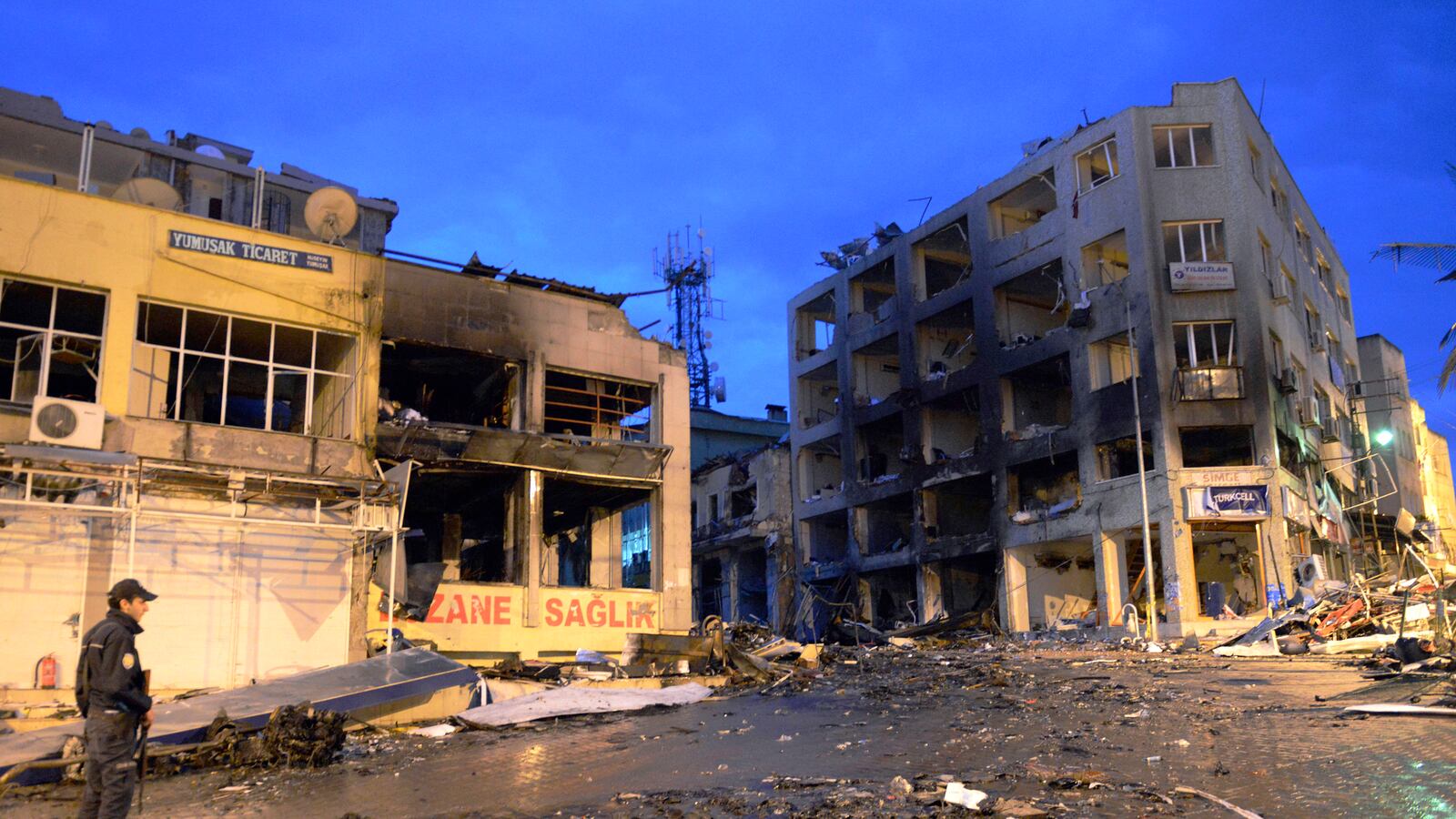Abdul Majid was a schoolteacher in Aleppo before Syria’s civil war reached the city, and like many Syrians—some 25,000, according to the local government—he now calls the Turkish border town of Reyhanli home. On Saturday evening, after a trip out of town, Majid was headed back to Reyhanli on a public bus when it was stopped and boarded by police. The officers had a warning for the Syrian passengers: when they got to Reyhanli, they should hide. “They said they wouldn’t be responsible for anything that happened to us,” Majid said after disembarking in Reyhanli with a group of Syrians who confirmed his account.

Earlier that day, two car bombs had devastated the town, killing more than 40 people and wounding nearly 150. Government officials were quick to link the blasts to the conflict in Syria, and some of Reyhanli’s residents beat them to the punch, attacking local Syrians whom they blamed for bringing the suffering upon them. By the time Majid arrived home, many Syrians were in hiding or had left.
On Sunday, Turkish authorities confirmed the Syria connection, arresting nine men they said were linked to Syrian intelligence—though they provided no details to support the allegations, and Syria’s information minister roundly denied them. Turkey has been a key backer of the rebellion against Syrian President Bashar al-Assad, leading the calls for international intervention while turning the border region around Reyhanli into a safe haven for displaced Syrians and a staging ground for rebels. Turkish officials warned that the attacks were meant to upset the delicate balance in the area—already strained by the influx of people and unnerved by the flow of revolutionaries and guns—and turn the locals against their Syrian guests.
Tensions flared in the bombings’ immediate aftermath, with Reyhanli showing signs of potential unrest. On one block, a group of preteens bludgeoned a parked car bearing Syrian tags. On another, a Syrian barber shop sat empty, its windows blown out by one of the blasts, as the shops around it buzzed with employees clearing away debris. Many Syrian residents had yet to return home on Sunday night.
Some Turkish politicians and commentators, meanwhile, rushed to blame Turkish Prime Minister Recep Tayyip Erdogan for his aggressive Syria policy, reenergizing long-standing demands in some quarters for Turkey to pull back. Turkish officials remained strident in their rhetoric, vowing a firm response, but the sense remained that one of the Syrian rebellion’s most ardent advocates had been dealt a chastening blow. As The New York Times noted, the Turkish government banned domestic news outlets from showing images from the blasts, in a possible bid to contain public backlash.
The attacks underscore Turkey’s vulnerability to Syria, says Salman Shaikh, the director of the Brookings Doha Center. Despite Turkey’s strong support for the opposition and regular tough talk, the country’s southern flank remains exposed, with a porous border and sectarian fault lines mirroring those that have opened up in Syria. Turkey also appears limited in how it can respond. “The Turks are actually weaker than their rhetoric,” Shaikh says.
In the past, stray artillery shells fired by the Syrian military have exploded on Turkish soil, with one killing five Turkish civilians last fall. Following some incidents, the Turkish military has responded by returning fire, and its NATO allies have installed Patriot missile batteries to help defend the border. In February, meanwhile, a car bomb exploded in the no-man’s-land at the busy border crossing near Reyhanli, killing 14 people in an attack Turkey also attributed to the Syrian government. But Saturday’s blasts were far more deadly—and the first Syria-linked attack undertaken on Turkish soil since the revolution began.
In addition, Shaikh notes, all nine of the men arrested over the weekend were Turkish citizens, raising the possibility that a long-standing Syrian government tactic of using proxy groups to rattle foreign rivals may be under way in Turkey. Turkish officials said on Sunday that the suspects were linked to a Marxist terrorist group with ties to Assad’s government. “What’s undoubtedly clear is that the Assad regime still has the ability to use proxies,” Shaikh says. “And that could be a message to not only the Turks, but to the Jordanians and other countries in the region that are supporting the opposition.”
But Turkey’s response, Shaikh says, will be contingent on its international allies—in particular the United States, which has been reluctant to support intervention measures long advocated by the Turkish government, such as a no-fly zone inside Syria. “Turkey has a dilemma. It has to establish deterrence,” Shaikh says—but Ankara is wary of wading too deeply into the Syrian conflict on its own. “This is a defining moment for Turkey.”
Erdogan begins a high-profile visit to Washington this week, and expectations that he will use the occasion to pressure the Obama administration into taking stronger action on Syria have now ratcheted up. On Sunday, Turkey’s foreign minister was already making that case, telling reporters that “it is time for the international community to act together against this regime.”
In a speech broadcast on Turkish television Sunday, however, Erdogan also signaled that Turkey would resist being drawn into the Syrian conflict against its will. “We will not lose our calm heads, we will not depart common sense, and we will not fall into the trap they’re trying to push us into,” he said. “Whoever targets Turkey will sooner or later pay the price.”
Michael Weiss, a Syria analyst and columnist with NOW Lebanon, points out that Erdogan had already been ramping up pressure on Washington in advance of his visit. In an interview with NBC late last week, the prime minister said Turkey believes Assad has used chemical weapons some 200 times—hammering home the idea that the Obama’s administration’s famous “red line” on Syria has been crossed multiple times. “And now he’s got a more serious message: they’re blowing things up in my country,” Weiss says.
—with Mahmoud Hassino




